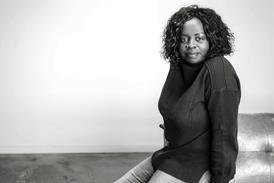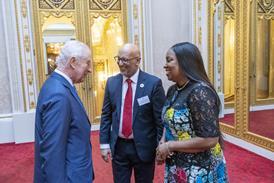
I have the most amazing life but I still wake up feeling horrendous
Thrust into the limelight two years ago when her father, Justin Welby, became the Archbishop of Canterbury, Katharine Welby-Roberts has struggled with depression and anxiety for several years. She talks to Ali Herbert about coping with mental health issues and the challenge of ending the stigma and fear surrounding mental illness
Can you tell us a bit about your life growing up?
I grew up all over the place! I was born in London, then my dad went to Durham to train as a vicar when I was three and there was a bit of moving around. I spent the bulk of my teenage years in Southam, Warwickshire where dad was parish vicar and then we moved to Coventry.
Where did you go when you left home?
I had a gap year, lived with my aunt in Oxford and worked for the post office, and then went on to study theology at Manchester University. After that I was unemployed for a year and experienced something of the benefits system, which was interesting. Then I moved to London and joined the police force.
That seems an unlikely next step!
Theology doesn’t naturally lead into policing I guess! But I care about justice and a lot of people who go into the police do join to make a difference. I was a police officer in Hackney for three years, which I enjoyed but found challenging. I was on duty the day after the Hackney riots and we worked through most of August with very long hours. I was absolutely shattered. My time in the police taught me a lot about the world, as you only really come into contact with people in their greatest tragedies and you see some of the darkest sides of humanity.
After that you suffered a nervous breakdown?
I was diagnosed with depression when I was 19. My mental health issues probably began in my mid-teens, but it was a few years before it was diagnosed and I didn’t take much notice of it until my breakdown. I was off work for five months and then I resigned from the police. For those five months I didn’t work, but then I got a job with Christian disability charity Livability which was a godsend.
Can you tell us some more about what Livability does?
The charity has a history of caring for those on the margins of society and working with churches and Christian organisations to build inclusive communities. We organise training for church leaders and volunteer teams, and we run projects like the Happiness Course – a four-session course looking at what happiness means. We also encourage churches to become dementia-friendly, walking alongside churches to help them realise their own capacity and resources. Society cuts out a lot of people as irrelevant or not worthy of our time, and the Church is called to be different. Jesus has given us the example to seek out people that others would ignore.
Your father became the Archbishop of Canterbury two years ago – what impact has that had on you?
It was a huge shock! I wasn’t very prepared for it and – for instance – hadn’t thought through the consequences of tweeting a picture of myself with a tea cosy on my head as a mitre … Fortunately my dad finds these things funny, though I do now have to think these things through. Being the daughter of the Archbishop of Canterbury has its good bits and bad bits. You have to be careful of who your friends are and that’s been hard as I have no filter and tend to be quite vulnerable with people. But it has opened a lot of doors to me – and I’ve met some amazing people who I would otherwise never have met in a million years.
Can you tell us a bit about your own faith journey?
Honestly speaking, faith makes no ‘logical’ sense to me and for a long time I got very stuck on that. During my time at university I wanted to test my faith, and it kind of broke it for a while. But I found I couldn’t let go of it fully. I couldn’t comprehend a world where God wasn’t God. As a teenager I prayed the ‘prayer’ endless times and my faith was alive during different parts of my youth. There were definitely key moments, for instance at Soul Survivor with Beth Redman talking about a world that I understood, and Matt Redman’s worship being very real. At around 21 years old, I went on a faith course at a church and realised then that my faith was real, but it’s only been since my nervous breakdown that I really began to explore the depths of who God is and realise the magnitude of what I believe in. It’s been an up and down journey, and it’s not over yet.
Has your faith affected your depression?
It helped me stop asking ‘Why?’ because there just isn’t rhyme or reason to why one person suffers with mental health issues and another doesn’t. And it showed me the idea of sitting in a hole and it being black and isolating – but recognising that I wasn’t alone and that God was with me. Sometimes I don’t talk to him for ages, and that’s fine. Breaking the rules has been helpful. I know I can be completely honest with God – angry, cross, happy, hopeful – so long as I always remember who I am dealing with. Like the Psalms, no matter how angry the writers get, they always have an acknowledgement of the might and glory and power of God.
What has your personal experience been of how churches deal with issues such as depression?
Some churches are great, often because the leader has some personal experience with disability or depression. But I’ve also had some bad experiences. People aren’t usually malicious, but they can be ignorant about the issues and don’t know where to start, or they can be frightened of people who have mental health issues.
What have you found most damaging in churches?
People often pray unhelpful things like, “Just pass all your anxieties on to Jesus” – but actually I’m already trying to do that! When it is my brain malfunctioning, I can’t just let go of that anxiety, I need to find a coping mechanism. Sitting on a tube thinking “I’m going to die because I’m surrounded by people” does not mean I’m not trusting God. It’s my brain that is not working fully. There are also guilt trips. For example, people imply that it’s your own fault – that now you’ve been prayed for you should be feeling better. But I’ve learnt that God’s love isn’t dependent on my surface happiness or by my making another person comfortable by not being miserable and depressed. God’s love surpasses that a million times over. He will never let me down.
What can churches begin to do to be more helpful to those suffering?
One in four of us have a mental health condition at some point, so the likelihood is that we all know someone suffering with it. Language is key, trying not to ‘fix’ people by quoting Bible verses. One of the most damaging verses I’ve been given again and again is, “God will not give you more than you can bear”, which is not even a real verse! It actually says he will not “tempt” you, and will give you a way out. Temptation and coping are very different from being able to ‘bear’ something. Does God think you can bear it if your whole family are killed in a car crash and you are left behind? No, of course not! No one can bear that. But he’ll be with you in that darkness.
Do you think attitudes about ‘living in victory’ can be unhelpful for people?
I have the most amazing life – I live in a palace! I have work that I love, a husband who I love and a gorgeous little puppy. My life is everything I ever dreamed of, but I still wake up most days feeling horrendous. We need great stories of people being healed, but we also need to hear from people who haven’t been healed but who have discovered that God is still with them. God doesn’t promise us we’re going to have a perfect life with wealth and riches, but he promises us that we’ll never be alone, that we’ll always be loved, that he will fight for us. If we talk about victory, we need to also talk about the fact that life isn’t always rosy. If we had more testimonies like that, I think we’d find people felt more at home in the church.
Do you think churches are generally more understanding now to those suffering with mental health issues?
There is an improvement in opinions about mental health across society as a whole. It is moving in the right direction. The media is getting better too. I have found I’m able to talk about these issues without it being an enormous deal, which means I can encourage others. A medical understanding of mental health is the most important thing – then we can drop the guilt and the shaming and the stigma, and start to support people. I saw a tweet last year that I loved: “If you wouldn’t ask someone what they’ve got to be asthmatic about, then why would you ask someone what they’ve got to be depressed about?” I haven’t got anything to be depressed about, but my brain is broken. If I had asthma, I would carry an inhaler, so I have anxiety pills for when I get anxious.
What advice would you give to someone who is struggling with their mental health?
The key is recognising that you are ill and getting the appropriate support – both from doctors and from ‘safe’ people. For instance, I know I can say to my husband, “I’m having a bad weekend” and he can then support me. Being able to say, “I’m ill” means you’re more likely to say you need help. The fear of being considered weak is a complete lie. Speak to your friends, family, people you trust and let them know how they can help specifically. For example, you might ask them to meet you for a coffee or keep you in mind and text you a couple of times, or you might ask them to pray for you particularly that week or perhaps cook a meal for you.
And what would you say to someone who has a friend or family member struggling?
Ask your friend what they actually have – is it diagnosed? If not, encourage them to go to the doctor or even offer to go with them. Be there with them, but recognise that it’s not your responsibility to carry them. They will need your support, but you may need support as well. You can’t be everything to that person: their counsellor, doctor, best friend … but do try to be available and to be aware of the impact of their illness on their life. Don’t tell them to snap out of it, but walk through it with them and gently encourage them.
Want to find out more?
The Access Pack has been launched this year to enable the Church to support those struggling with mental health. It is a free resource with information, practical and pastoral tips and some theological perspectives, and is available at www.mentalhealthaccesspack.org Tel: 020 7452 2000
The organisation Mind and Soul seeks to bridge the gap between churches and mental health care settings and is at www.mindandsoul.info Tel: 020 7316 1300
Find out more about the work of Livability from www.livability.org.uk Tel: 020 7452 2000
Read Katharine’s blog at www.katharinewelby.com
This month it’s Mental Health Awareness Week (May 11th–17th) and the focus is on Mindfulness. Find out more at www.mentalhealth.org.uk





























